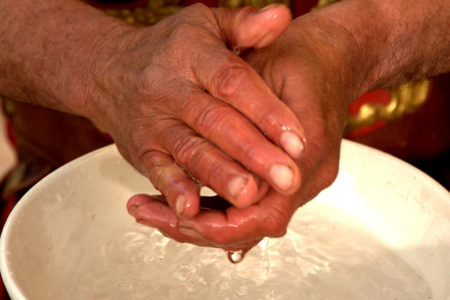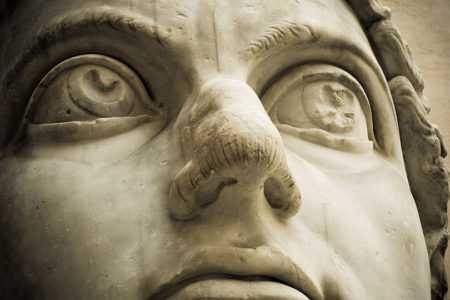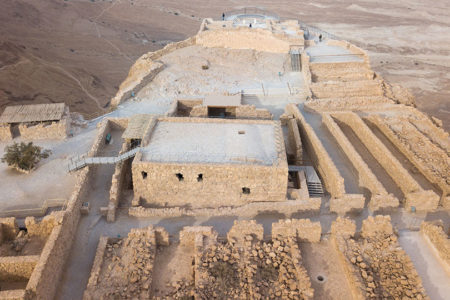Baptism or Mikveh
“Steve, I can’t do it, I just can’t do it. I know all about the plans we’ve made, but this is not going to happen. I’m Jewish; this would be too much for my family.” The voice on the other end of the phone was quivering with emotion. This was not the Mike I knew. Usually he was self-assured, confident, and strong. On the phone he sounded frightened and intimidated.
Mike and I had met through a mutual friend and immediately struck up a friendship. Over time he and his wife became interested in spiritual things and began attending our home Bible study. After many meetings and dozens of answered questions, Mike received Jesus as his Messiah. He was so excited! Constantly reading God’s Word brought Mike to the inevitable question of baptism. He soon began planning his own private ceremony, with a sensitivity toward his many invited Jewish guests. He really wanted the opportunity to explain to them what had happened in his life. The leadership at a local church agreed to allow the use of their facilities. The date was set, and more than 50 invitations were sent.
His phone call canceling the ceremony came on the very day it was scheduled to occur, just hours before it was to start. What had happened? And why?
Most Gentiles and Christians consider it a privilege to witness or participate in a baptism. This is not the case for Jewish people, however, who view it as taboo for several reasons. First, Jews who are baptized are viewed as meshumeds, or traitors. In Jewish eyes, they have shamed their families and the Jewish community by forsaking their people, their heritage, and their traditions. Second, baptism speaks to the Jewish person of forced conversion, a reminder of the thousands of people over the years who were threatened with the loss of property or life if they refused to undergo it. Baptism is associated with Christianity and is generally viewed as no friend of the Jewish people. Just the very word baptism causes shivers to run up the spines of many Jewish people.
On the phone Mike told me he had been thinking about what was going to take place. He thought about the effect baptism would have on his family, some of whom had said they were deeply hurt and would never attend such an event. Mike said, “I’m not a traitor, but they think I am. I don’t know if I can bear that thought.”
Was Mike’s family correct? Was he a Jewish man betraying his heritage? What was I to tell him?
Immersion is nothing new to the Jewish people. Its purpose has always been for cleansing, although not physical cleansing. Maimonides, the great Jewish sage, said, “Uncleanness is not mud or filth which water can remove, but is a matter of scriptural decree and dependent on the intention of the heart.” Thus, rabbinical thought holds that there must be a special intent for being immersed, or there is no value in the immersion.
During the days of the Tabernacle and Temple, Jewish law required immersion in the event of spiritual uncleanness, such as contact with a dead body (Num. 19) or an emission of unclean bodily fluid (Lev. 15). In 70 A.D., such immersions ceased due to the Roman destruction of the Temple. Other kinds of immersions continued, however.
Today, immersions take place for a variety of reasons. They are carried out in a mikveh, “a collection of water.” This special pool contains a minimum of 120 gallons of water, the majority of which must be “moving,” such as rain, melted snow, or ice. These ritual baths are divided into two sides, one for men and one for women. The “bathers” must first shower, and they then are given white cotton coverings to place on their bodies. They are escorted into the bath, where complete submersion must be achieved.
Orthodox Jews (a minority of the Jewish population) are usually the only ones who use a mikveh today, which is why these baths are primarily located in religious neighborhoods. Tevilah, or immersion, is used when a person converts to Judaism or in preparation for special days like the Sabbath or the Day of Atonement. Couples about to be married must enter the waters of a mikveh, separately, just before the wedding.
While there are many reasons for a mikveh, it is most often used by married women who have been in a state of separation (niddah) from their husbands during their monthly cycle. The Torah demands that couples abstain from marital relations during this time. Before they resume relations, the wife must go into the waters of the mikveh for purification. As the woman immerses herself, she recites two blessings: “Blessed art thou, O Lord our God, King of the Universe, who hast hallowed us with thy commandments and commanded us concerning immersion,” and “Blessed art thou, O Lord our God, King of the Universe, who hast kept us in life and sustained us and enabled us to reach this significant moment.” Once she has immersed herself, she is ready to come together with her husband.
Regardless of the reason for the immersion, its importance is regarded as internal, not external.
The Gospels tell of a Jewish prophet named John who came out of the wilderness of Judea to preach a message of repentance to his people. He was to prepare them for the Messiah and the coming kingdom, which was at hand. Jewish people from Jerusalem and all of Judea came to him to be immersed in the Jordan River, where they publicly confessed their sins.
Luke records that the people wondered if John himself was, in fact, the Messiah. John responded by saying, “I indeed baptize you with water; but one mightier than I cometh, the latchet of whose shoes I am not worthy to loose” (Lk. 3:16).
These were Jewish people, called by a Jewish prophet, to do a perfectly acceptable and necessary biblical thing—immerse in a body of moving water to publicly express an inward reality. In this case, it was to express sorrow for sin. Remember the rabbinical rule: There must be special intent, or the immersion is useless.
When Jesus arrived, John was reluctant to baptize Him, requesting instead that Jesus baptize him. He correctly stated that Jesus was greater than he: “He must increase, but I must decrease” (Jn. 3:30). Jesus insisted, however, that John baptize Him. Jesus needed no inward or outward cleansing, but His public baptism was used by God as a significant ceremony to launch His Son’s earthly ministry, as well as to introduce Him to and identify Him with His people. This would begin His public and prophetic journey to His death and resurrection.
Followers of Jesus today do not receive baptism because there is something unique or powerful about the water. Without a heart decision, without that “intent of the heart” as described by the rabbis, baptism is just a public show. But when people recognize that they are sinners and that the provision to satisfy a holy God has been met through the person of the Messiah, Jesus, they desire to identify with His death and resurrection.
As Mike and I discussed his decision to halt his baptism, I could sense that something was happening, even as we spoke on the phone. His voice was gaining strength and a sense of confidence. For a few minutes, it seemed that he was speaking, not to me, but to himself. It was almost as if I was not even there. He was actually talking himself into going through with it. He knew this would be his opportunity to explain, in his own words, the very Jewish thing he was doing. He could assure his family and friends that he would never betray his Jewish heritage, a heritage he was very proud of. He could tell them that he loved them and that his only desire was for them to read the Jewish Scriptures, where they too could find the Messiah. He could tell them that he understood why this ceremony might cause some pain. As he would stand in that little baptismal pool in a small local church, he could tell them that his decision to receive Christ had brought him peace and joy and that by being baptized he could explain his action to everyone at the same time. Just before the conversation ended Mike said, “Steve, we have to do this.”
And that is exactly what we did!








Thank you Sir for this story, I am doing a research on the Jewish roost of Baptism and your story help me to understand the concept more.